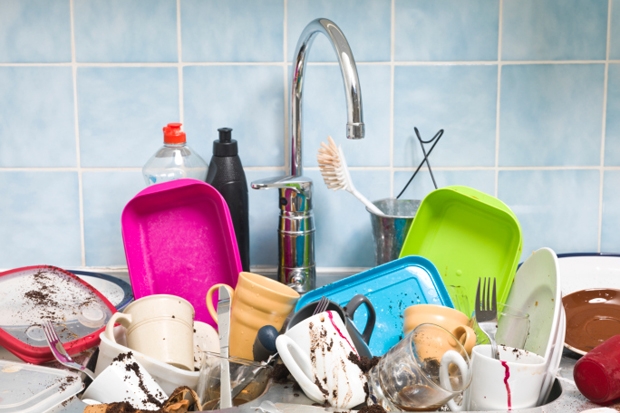I have been having trouble with my dishwasher. It’s seven and a half years old, and it’s manufactured by a German company called Miele. Several important people told me at the time that anyone who was anyone had a Miele dishwasher, so naturally I bought one. I found it perfectly satisfactory until a couple of weeks ago, when it suddenly stopped working; so I called up Miele and they sent someone to investigate. He said he’d repaired it and charged me £117 for the visit. But when I turned it on afterwards, the lights fused. So another Miele man came and said that his colleague hadn’t noticed that it was in fact a wreck and would need £500 spending on it for it to work again. So I took his advice and, instead of getting it repaired, ordered a new Miele for £599, the cheapest one on offer. This is due to arrive next week. Meanwhile, there is still a large mound of dirty crockery waiting for attention.
This has got me wondering whether there is really any point in dishwashers. Of all the labour-saving appliances developed in the last century, it is perhaps the least useful. Washing up by hand is not particularly burdensome — it can even be quite pleasant and therapeutic. Yet once you have a dishwasher, it is impossible not to use it. If you have only one dirty coffee cup to wash, something prevents you from rinsing it under the tap. Into the dishwasher it must go. And there it must languish until the machine is full and the long washing cycle begins.
Apart from the fact that it takes much longer to wash the dishes in a machine than to do it by hand, it is doubtful whether it saves much labour. There is the wearisome business of loading and unloading it. This is not only bad for the back if the dishwasher, like mine, is on the floor; it is a long and challenging process. There are some enviable people who just chuck the plates into it any old how, but I am not one of them. Something compels me to arrange all the crockery in neat rows by size and function, and this demands time and concentration. It is also a cause of much tension if someone else, trying to help, loads the dishwasher in a less ordered way.
It’s not even as if dishwashers always do their job properly. Time and again they whirl away for a couple of hours and then yield smeared glasses and stain-encrusted dishes that have to be washed again under the tap. In the early days, when dishwashers were still known as washing-up machines, it was advised that every item should be rinsed before being put into them, which seemed to defeat their principal purpose. This is still a precaution that should be taken if a happy outcome is to be guaranteed.
The first domestic dishwasher similar to today’s, which included a rotating sprayer and a wire rack to hold the crockery, was invented in 1924 by an Englishman, William Howard Livens, who is best known for having created the ‘Livens Projector’, a device for delivering poisoned gas into the German trenches during the first world war. It didn’t catch on, and it wasn’t until the 1970s that the use of dishwashers became widespread in Europe and the United States. Now they are more or less ubiquitous. Yet their shortcomings are not going unrecognised.
The grandly named Dr Raul Pérez-Mohedano of Birmingham University and a team of researchers have been studying how to make them work better, and they have reached the conclusion, after exhaustive research, that plates stacked in a circle round the cutlery basket would emerge much cleaner than those stacked in straight lines, as they are now. Maybe that is so, but I suspect that it will only make the task of the stacker even more arduous than it is already. There seems to be no satisfactory solution to the dishwasher problem, but we are now irrationally addicted to these machines, so they will be spared the oblivion of other such ill-conceived kitchen appliances as the electric carving knife. The best we can do to lessen the drudgery of loading and unloading is to use them as permanent storage places for our tableware, leaving everything inside them until the table needs laying for the next meal. A better option still would be to rediscover the forgotten pleasures of gentle washing-up.






Comments